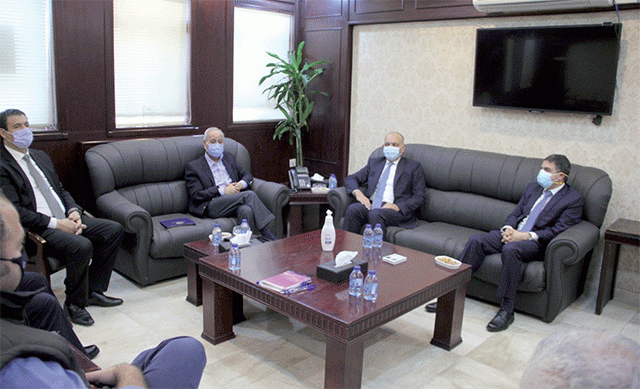You are here
Chambers of industry head ask for implementation of principle of reciprocity with Egypt
By Bahaa Al Deen Al Nawas - Aug 17,2020 - Last updated at Aug 17,2020
AMMAN — In light of bureaucratic and technical hurdles facing Jordanian products exported to Egypt, head of the Jordan and Amman Chambers of Industry, Fathi Jaghbeer called on the government to implement the principle of reciprocity.
The obstacles facing national exports are causing manufacturers to shoulder extra financial burdens because of late approvals, Jaghbeer said in a statement shared with The Jordan Times on Monday.
One of the problems is that the Egyptian side’s conditions to register Jordanian factories that wish to export to it at the concerned Egyptian institutions, according to Jaghbeer could take a lot of time to achieve.
Jaghbeer pointed out that Jordan does not impose such conditions on Egyptian exports.
Among the top products that face challenges to gain approval are medicines, the registration of which could take years with “heavy costs”, according to Jaghbeer.
He added that the problem has been presented to the Egyptian side in many meetings.
The head of the chambers said that the same problems face exporting animal drugs, fertilisers, pesticides and cosmetics, especially Dead Sea products, all of which also take many years and cost a lot to be exported.
Moreover, the Egyptian authorities sometimes ask for the "factory licence" as part of the export documents, Jaghbeer said.
He noted that the Ministry of Industry, Trade and Supply issues a "registration certificate" to factories, not a licence.
"The Egyptian authorities also sometimes send back the certificate of origin issued by Jordanian chambers of industry, in spite of them having the seal of the Ministry of Industry, Trade and Supply," Jaghbeer said.
He added that they are returned under the pretext that the acknowledged signatures of concerned persons do not match those on the certificate, dismissing it entirely due to the “minutest difference” in signatures.
There are also challenges related to the Egyptian side’s request to attach a fumigation certificate valid for 12 days with the cargo, Jaghbeer said, noting that sometimes the heavy traffic facing ships heading to the Nuweiba Port causes the certificates to expire.
When the Jordanian cargo is exported through the Nuweiba Port, samples are sent from there to Cairo for testing, taking two weeks for the results to be sent back, under the condition that the cargo remains still and is not moved from the port, which Jaghbeer said imposes heavy financial burdens on exporters, who pay for docking and other shipping fees.
The obstacles include conditions imposed on importing meat and chicken from the Kingdom, which suggest having committees from the General Organisation for Veterinary Services in Egypt supervise the manufacturing process entirely for the Jordanian companies' products of meat and chicken exported to Egypt.
They also commit Jordanian companies to bear the costs of travel and stay for the committees, according to Jaghbeer.
The Egyptian authorities also imposes limitations on raw materials of hygienic paper prepared for manufacturing, including the International Laboratory Accreditation Cooperation testing certificate, Jaghbeer said, noting that they are raw materials, not a final product, and should not having to obtain a certificate adding more costs and time.
Related Articles
AMMAN — Jordanian exports to Egypt face non-customs technical and administrative obstacles that limit national products’ access to the Egypt
AMMAN — Head of the Jordan Chamber of Industry (JCI) Fathi Jaghbeer on Wednesday called for enhancing partnerships and coordination with the
AMMAN — The Amman Chamber of Industry (ACI) on Tuesday launched the “Made in Jordan 2020-2025” vision, in accordance with His Majesty King A














